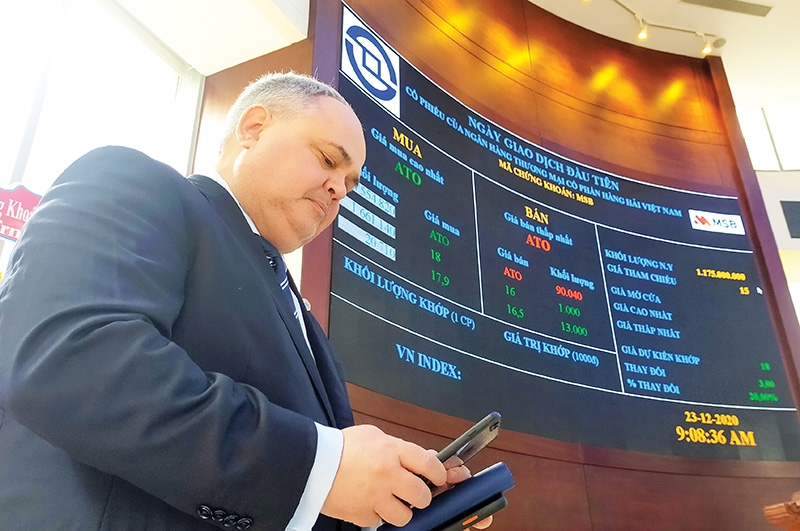New entity to invigorate Vietnam’s stock markets
 |
| The Vietnam Stock Exchange will help remove technical loopholes |
Prime Minister Nguyen Xuan Phuc last week approved to establish the Vietnam Stock Exchange (VNX), which will be located in Hanoi. According to the PM’s decision, which will take effect from February 20, the exchange is being created as a one-member limited liability company, with the charter capital held entirely by the state.
The VNX has charter capital of VND3 trillion ($130.43 million), and will be in charge of preparing strategic plans for equity market development, as well as monitoring securities listing, trading, and information disclosure.
The exchange will report and propose recommendations to the State Securities Commission to effectively respond to global market fluctuations, as well as ensure domestic market stability.
Furthermore, the major bourse will be in charge of managing the Hanoi Stock Exchange (HNX) and the Ho Chi Minh City Stock Exchange (HSX). Currently, the HSX concentrates on operating the common stock market and other securities products, while HNX takes control of derivatives and bond markets.
Especially, the VNX is envisaged to clear technical loopholes, especially after a series of technical securities incidents on the HSX. There are more than 1,660 stocks being publicly traded on the HSX, HNX, and the Unlisted Public Company Market (UPCoM).
The decision specifies companies with 100 per cent charter capital held by the VNX, including the HSX and HNX. It will decide the charter capital of both after obtaining approval from the Ministry of Finance.
This past year has witnessed a surge of exchange traded funds (ETFs) making in-roads in Vietnam, such as MAFM VN30, SSIAM VNFIN LEAD, VFMVN Diamond, and VINACAPITAL VN100.
Local ETFs, albeit still in their infancy, have quickly gained trillions of VND. For example, VFMVN Diamond, which filed for an initial public offering in May 2020 at over VND100 billion ($4.35 million), reached more than VND4 trillion ($173.9 million) in its fund size, a nearly 40-fold increase.
Foreign private equity funds are also showing their eagerness towards the industry, with a string of new players such as Vietnam Growth Investment Fund – a joint venture of SSI, Thailand’s C.P. Group, and the Development Bank of Japan.
Specifically, Vietnam has welcomed an increasing trend of inexperienced investors, or F0 investors, to join in a rush of market euphoria, with new opening accounts reaching record highs.
Given the ultra-low interest rate and social distancing keeping millions of people at home for a period of time, people have poured more money into stocks, hoping to hit the jackpot or at least build higher profits than through depositing money at banks.
“A boom on F0 investors may come from two reasons. Firstly, stock markets are becoming more attractive. Supporting policies like lowering interest rates and increasing money supply would result in a devaluation of currencies and commodities. In addition, a stagnant real estate market can mean an increase in stock investment,” Le Quang Minh, head of Research at Mirae Asset Securities, told VIR.
“Secondly, social distancing policies earlier in the year have led young people to find available trading platforms on mobiles or laptops,” he said. “This way of brokerage has lower costs of trading and online interaction between brokers and investors. Communication is also more efficient than face-to-face meetings.”
According to the Japanese Chamber of Commerce and Industry in Vietnam (JCCI), the Vietnamese government should clarify the operational standards for insider trading restrictions related to the trading of publicly-listed company shares.
“Moreover, we also expect the relaxation of restrictions on foreign ownership limits in publicly-listed companies, and the revision of the stock price valuation method and divestment method of state-owned enterprise stocks,” noted a JCCI representative. “For example, we hope to see improvements in the fact that open bidding is stipulated as a principle and that conducting due diligence is not clearly stipulated in law.”
Meanwhile, non-nationals have called for the implementation of non-voting depository receipts (NVDRs) to encourage local companies to attract more overseas funds.
Following the footsteps of NVDRs in Thailand, they can stimulate trading activities and eliminate barriers on foreign caps.
In other words, when investors fund NVDRs, they would receive the same financial benefits including dividends, right issues, and warrants as ordinary shareholders, but no voting rights. If overseas investors own NVDRs, they will not amount to an increase in the foreign ownership limit of the company, which will not abuse voting rights.
What the stars mean:
★ Poor ★ ★ Promising ★★★ Good ★★★★ Very good ★★★★★ Exceptional
Related Contents
Latest News
More News
- Private capital funds as cornerstone of IFC plans (February 20, 2026 | 14:38)
- Priorities for building credibility and momentum within Vietnamese IFCs (February 20, 2026 | 14:29)
- How Hong Kong can bridge critical financial centre gaps (February 20, 2026 | 14:22)
- All global experiences useful for Vietnam’s international financial hub (February 20, 2026 | 14:16)
- Raised ties reaffirm strategic trust (February 20, 2026 | 14:06)
- Sustained growth can translate into income gains (February 19, 2026 | 18:55)
- The vision to maintain a stable monetary policy (February 19, 2026 | 08:50)
- Banking sector faces data governance hurdles in AI transition (February 19, 2026 | 08:00)
- AI leading to shift in banking roles (February 18, 2026 | 19:54)
- Digital banking enters season of transformation (February 16, 2026 | 09:00)

 Tag:
Tag:


















 Mobile Version
Mobile Version